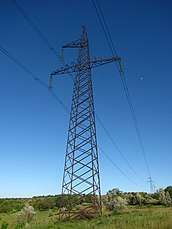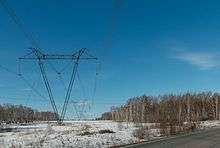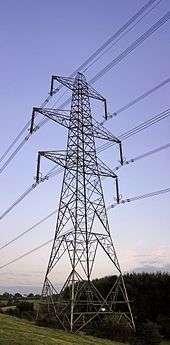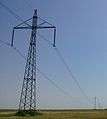Suspension tower
In an electric power transmission line, a suspension tower is where the conductors are simply suspended from the tower, the mechanical tension being the same on each side.
In this case, the tower is supposed to carry a downward force, and a lateral force, but not a longitudinal force.
These may have, for each conductor, an insulator string hanging down from the tower, or two strings making a "V" shape. In either case, sometimes several insulator strings are used in parallel to give higher mechanical strength. These are used where a transmission line continues in a straight line, or turns through a small angle. In other cases, a tension tower (C or D Towers) is used.
 A suspension tower of a 35 kV powerline in Ukraine
A suspension tower of a 35 kV powerline in Ukraine Suspension towers of a 110 kV power line in Germany
Suspension towers of a 110 kV power line in Germany A suspension tower of a 330 kV powerline in Ukraine
A suspension tower of a 330 kV powerline in Ukraine A suspension tower of a 1150 kV powerline in Russia
A suspension tower of a 1150 kV powerline in Russia In France it's common to bend lines at suspension towers with single insulators pulled to the side
In France it's common to bend lines at suspension towers with single insulators pulled to the side A suspension tower, UK
A suspension tower, UK Suspension towers in Sweden
Suspension towers in Sweden Row of suspension pylons near Amsterdam in the Netherlands
Row of suspension pylons near Amsterdam in the Netherlands HVDC suspension tower
HVDC suspension tower
See also
This article is issued from Wikipedia. The text is licensed under Creative Commons - Attribution - Sharealike. Additional terms may apply for the media files.